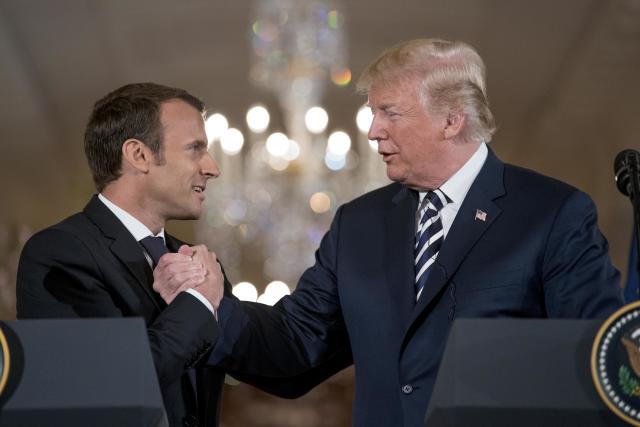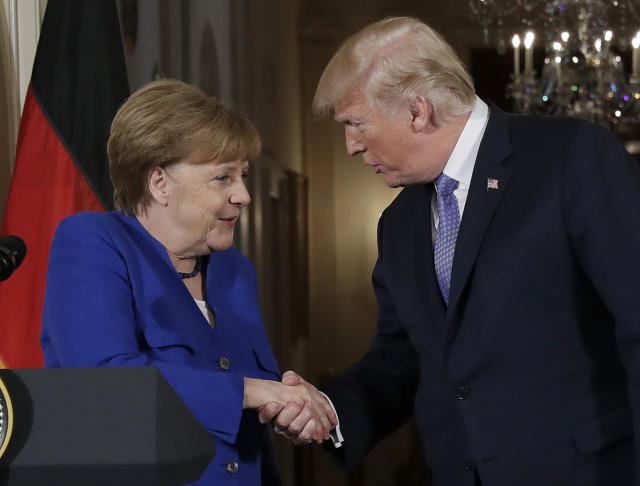
President Trump, German Chancellor Angela Merkel, and French President Emmanuel Macron. (Yahoo News photo-Illustration; photos: AP, Getty)
During an extraordinary week of diplomatic hand-shaking, backslapping and cheek-kissing, President Trump offered a glimpse of the master dealmaker he promised to be during his campaign. After Trump put transatlantic allies on notice last year that the United States was prepared to walk away from a flawed Iran nuclear deal unless specific weaknesses were fixed, both French President Emmanuel Macron and German Chancellor Angela Merkel dutifully traveled to the White House this week with proposed fixes in hand.
Meanwhile, having recently returned from North Korea to prepare for an unprecedented summit between Trump and Kim Jong Un, CIA Director Mike Pompeo was confirmed by the Senate as secretary of state. Suddenly there was momentum and a sense of strategic coherence behind the administration’s signature nonproliferation initiatives.
In a sign of the profound unpredictability at the core of Trump’s “America First” foreign policy, however, the brief sense of alliance bonhomie and unity began to evaporate even before the week was out.
At the end of his whirlwind visit to Washington, Macron told a group of reporters that he still thinks Trump will scuttle the Iran nuclear agreement as part of a “strategy of tension.”
“My view — I don’t know what your president will decide — is that he will get rid of this deal on his own for domestic reasons,” Macron told reporters. The continuing wild swings in U.S. positions, he noted, “can work in the short term, but it’s very insane in the medium to long term.”
In her own press conference with Trump on Friday, the ever-cautious Merkel conceded that the Iran nuclear agreement was “anything but perfect” and was just “one building block” in a structure of containment and pressure that Europeans are discussing with their American counterparts. Trump refused to speculate about the need to use military force if the agreement collapsed, beyond warning, “I can tell you this: [Iran] will not be doing nuclear weapons. You can bank on it.”

The coordinated visits from the leaders of these two key allies were dubbed “the save the Iran nuclear agreement trip[s]” by Heather Conley, director of the Europe Program for the Center for Strategic and International Studies. (Trade policy and Russia were also on the agendas.) British Prime Minister Theresa May also added her voice to those pleas in a phone call this week to President Trump.
Trump must decide by May 12 whether to recertify the nuclear agreement for the next six months, and he is insisting on substantial additional concessions from Iran. In principle, the U.S. could withdraw from the agreement while the other parties — Iran and the P5 (the five permanent members of the U.N. Security Council) plus Germany — keep it in force, but it’s hard to imagine how this would work in practice. “That means after May 12 a real train wreck is probably coming, with very damaging consequences that are hard to predict,” says Joseph Cirincione, president of the Ploughshares Fund, a foundation focused on nuclear weapons policy and conflict resolution.
After working for more than a decade on the complex diplomacy behind the Iran nuclear agreement, the Europeans consider it their crowning nonproliferation achievement. Along with the United States, they helped erect a crippling sanctions regime that isolated Iran and forced it to the negotiating table. The deal that was eventually reached by the Obama administration in 2015 required Iran to eliminate most of its stockpile of enriched uranium, limit its ongoing enrichment activities for 10 years to a single facility, and grant International Atomic Energy Agency inspectors access to all nuclear facilities. In exchange, the U.S. and its partners agreed to lift economic sanctions.
There was never any question that President Trump was going to drive a hard bargain in insisting on fixes to what he has called “one of the worst and most one-sided transactions the United States has ever entered into.” The appointment of the very hawkish John Bolton as national security adviser and Pompeo as secretary of state have reinforced that perception.
Earlier this year, the State Department outlined specific areas where the Iran agreement would have to be strengthened by a “supplemental agreement” with European allies, including mechanisms to extend the restrictions on uranium enrichment beyond the 10-year sunset (now seven years away) and imposing a more aggressive verification regime. In addition, the U.S. is seeking concessions by Iran on matters unrelated to nuclear weapons, including its ballistic missile program and support for extremist groups in the Middle East.
State Department officials said the Europeans had come a long way toward meeting those benchmarks. “What President Trump asked for is a supplemental agreement with our allies that would allow the United States to stay in the Iran nuclear deal. We’re not there yet, but we’ve made progress,” Brian Hook, the chief U.S. negotiator and director of Policy Planning at the State Department, told National Public Radio this week. “We’ve worked very well with the Europeans to try and get a supplemental agreement.”

But Trump himself signaled both privately and publicly this week that the efforts of the Europeans fell short. “Nobody knows what I’m going to do on the 12th, although, Mr. President, you have a pretty good idea,” Trump said during a joint press conference with Macron on Tuesday. “But we’ll see if I do what some people expect, whether or not it will be possible to do a new deal with solid foundations. Because this is a deal with decayed foundations. It’s a bad deal. It’s a bad structure. It’s falling down.”
Macron said that Trump’s message in private was virtually identical to his campaign criticisms of the deal. “When people say that President Trump is not predictable, I think the opposite; he is very predictable,” Macron told reporters at George Washington University, according to BuzzFeed. “[Trump] repeated in his office two days ago,” Macron said, “that this was the worst deal ever — it’s a nightmare, it was a catastrophe, and so on and so on.”
“For a moment it looked like Trump was going to agree to the long-term ‘fixes’ and the difficult concessions offered by our European allies and lend credence to his claim to be a master dealmaker who can make deals that other presidents failed to do,” Cirincione said in an interview. While Trump could still take “yes” for an answer and recertify the Iran agreement on May 12, he said, it looks increasingly likely that he has sent Macron and Merkel home empty-handed to face domestic criticism for glad-handing with an unpopular U.S. president, and with nothing to show for it.
If Trump walks away from the Iran agreement, the administration and Congress are likely to reimpose the economic sanctions that isolated Iran from the global financial system, leveraging the dollar’s dominant position in the international banking system. If that happens, European allies who want to preserve the agreement say they will ask for exemptions so their banks and companies can continue doing business with Iran. Such narrowly targeted exemptions, however, may be unfeasible.

“People tend to think about these economic sanctions like an easy ‘on-off’ switch that can be flipped as required to aid diplomacy, but you are really unleashing financial furies that, once free, are very hard to call off their targets,” said Juan Zarate, a former Treasury Department official who helped craft the sanctions and the current chairman of the Financial Integrity Network. Iran never fully reintegrated into the global financial system, even with the nuclear agreement, Zarate said. “In an environment in which the United States is going to expand sanctions, the private market and international banks will likely find it too risky once again to do business with Iran.”
In that event Iranian officials have threatened publicly to restart their mass uranium enrichment program, pushing Iran closer to a nuclear weapons capability and back on the path toward military conflict with the United States. Only this time Tehran will have accomplished its long-standing goal of driving a wedge between the U.S. and Europe and isolating Washington.
“Assuming President Trump walks away from the Iran nuclear agreement, the Europeans will probably try and keep it alive somehow, but that will be very hard to achieve because every option will require that they trust the United States to keep its word going forward,” said Christoph von Marschall, a resident fellow at the German Marshall Fund of the United States. “Because of the Trump administration’s inability to speak with one voice, and President Trump’s love of ambiguity and unpredictable decision making, there is just a fundamental lack of trust now in the transatlantic relationship.”

No comments:
Post a Comment